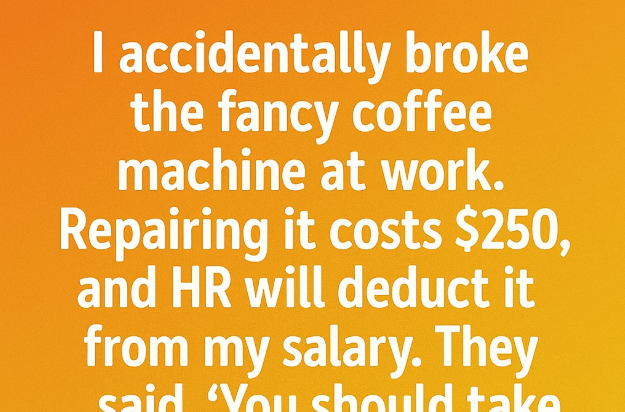Accidentally, I damaged the elegant coffee machine in the office one afternoon, and the Human Resources team promptly notified me that they planned to deduct the full $250 repair expense directly from my upcoming paycheck. Their message arrived clearly and professionally, emphasizing how personal accountability strengthens the entire workplace environment. I accepted their decision with a calm nod, though a quiet disappointment settled in my chest for a moment. Rather than protest or complain, I left for the day carrying the incident with me, turning it over in my mind like a puzzle waiting to be solved. That evening, inspiration arrived gently, and by sunrise I carried a thoughtful strategy ready to unfold.
Before the building stirred with its usual morning energy, I slipped in quietly, carrying only determination and a small toolkit. The previous night I had studied several detailed repair videos from experienced technicians, absorbing every step with full attention. When I carefully removed the machine’s outer panel, a wave of genuine relief washed over me—the problem revealed itself as nothing more complicated than a slightly displaced component that required precise realignment. With steady breathing and patient fingers, I guided the part back into perfect position. Moments later, the familiar welcoming hum returned, accompanied by the rich aroma of fresh coffee filling the break room. I wiped down every surface until the machine appeared exactly as pristine as before, then stepped back to admire the quiet victory.
As colleagues began streaming through the doors, their faces lit up with delighted surprise. The line for espresso formed instantly, accompanied by cheerful chatter and laughter that had been missing for days. Members of the HR team arrived shortly afterward, eyebrows raised in pleasant confusion before softening into visible relief. When they asked what happened, I explained calmly that I had taken a closer look and discovered the fault turned out to be minor after all. They expressed sincere appreciation, and by midday an official company email circulated, warmly recognizing “outstanding employee initiative” that successfully avoided unnecessary external repair costs. Without any further discussion, the planned salary deduction vanished from the records entirely.
I never sought recognition or praise; the satisfaction of restoring something valuable for everyone felt reward enough. Watching the team gather around their restored morning ritual brought a deep sense of fulfillment that no public acknowledgment could match.
Later, as I gathered my belongings to head home, one of my colleagues approached carrying a steaming cup prepared exactly the way I prefer it—strong, with a touch of milk—and offered it with a genuine smile of gratitude. In that simple gesture, understanding settled over me like warm sunlight: true responsibility embraces both owning our mistakes and actively pursuing meaningful solutions. Quiet, considerate steps often transform potentially difficult situations into moments of connection and growth. Stepping into the evening air, my heart felt remarkably light, enriched by the knowledge that I had navigated the challenge with composure, kindness, and unwavering integrity.
That small experience with the coffee machine became a gentle reminder that workplaces thrive when people choose proactive care over blame. Every day presents opportunities to contribute positively, even in unexpected ways. By approaching problems with curiosity and respect, we create ripples of goodwill that benefit the entire team. I walked to my car carrying more than a free cup of coffee—I carried renewed confidence in the power of thoughtful action and the quiet strength found in doing the right thing simply because it matters.







